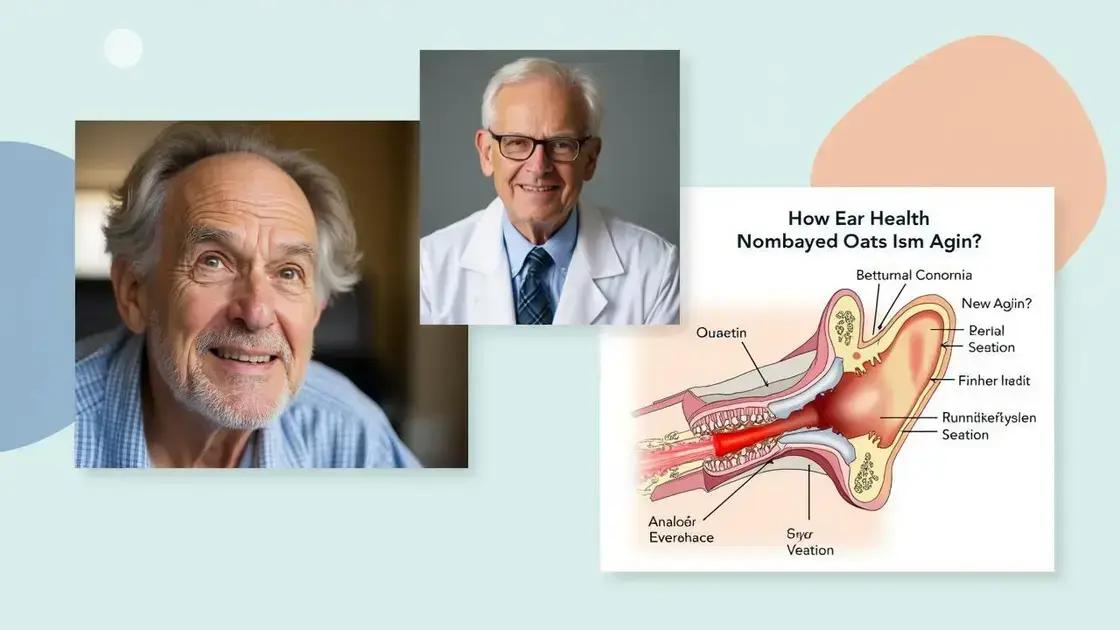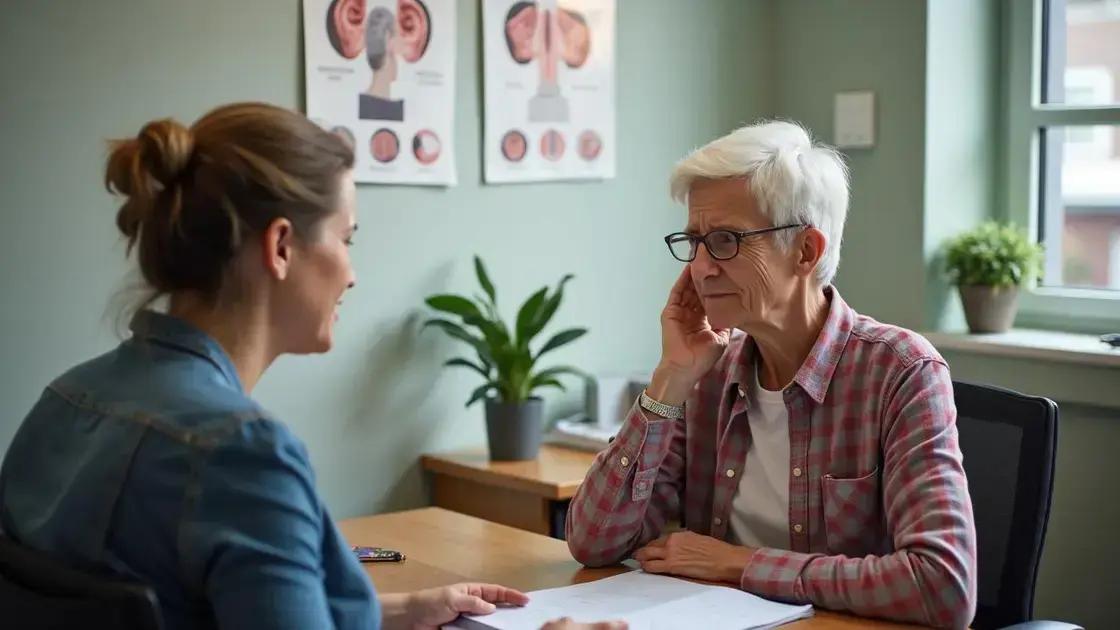To prevent hearing loss as you age, it’s essential to understand its common causes such as aging, noise exposure, and certain health conditions. Effective strategies include wearing ear protection, practicing safe listening, and scheduling regular hearing check-ups. Seek professional help if you experience difficulty understanding conversations, notice tinnitus, or feel fatigued after discussions.
As we age, it’s crucial to prioritize our hearing health. Hearing loss is a common concern among older adults, but the good news is that there are proactive steps we can take to prevent it. By understanding the factors that contribute to hearing loss as we age, such as environmental noise and underlying health issues, we can implement effective strategies to safeguard our auditory well-being. In this article, we’ll delve into essential tips and information on how to prevent hearing loss as you age.
Understanding Hearing Loss and Aging

As people grow older, it is crucial to understand how hearing loss relates to aging. Many individuals experience some level of hearing impairment as they age, and recognizing the signs early can be beneficial.
What Is Hearing Loss?
Hearing loss refers to the partial or total inability to hear sounds. There are different types of hearing loss, which can occur due to various factors. Understanding these factors is vital in developing preventive strategies.
How Aging Affects Hearing
As we age, our bodies undergo several changes, including our auditory system. Aging can cause deterioration of the tiny hair cells in the inner ear that help transmit sound signals to the brain. This condition is known as presbycusis, a gradual loss of hearing that commonly affects older adults.
Common Symptoms
Some common symptoms of hearing loss include:
- Difficulty understanding conversations, especially in noisy environments.
- Frequently asking others to repeat themselves.
- Feeling that others are mumbling or speaking too softly.
- Trouble following conversations in groups.
Noticing these signs can be the first step toward addressing hearing health.
Importance of Early Detection
Early detection of hearing loss is vital. Many people may not realize they are losing their hearing until it affects their daily life. Regular hearing check-ups can help catch issues early, making it easier to manage them.
Understanding the relationship between hearing loss and aging empowers individuals to take proactive steps toward preserving their hearing health.
Common Causes of Hearing Loss

Several factors can contribute to hearing loss, especially as one ages. Understanding these common causes is crucial for prevention and management.
Aging
Aging is one of the most significant factors affecting hearing. As we grow older, the structures in the ear can gradually wear down, leading to a decline in auditory function. This process often starts around middle age and intensifies over the years.
Noisy Environments
Regular exposure to loud sounds can damage the delicate hair cells in the inner ear. Workplaces, concerts, and construction sites are examples of environments where noise levels can reach harmful levels. Protecting your ears in such situations is essential.
Ear Infections
Repeated ear infections can also contribute to hearing loss, especially in children and older adults. Inflammation and fluid buildup from infections can lead to temporary or permanent damage to the auditory system.
Health Conditions
Certain medical conditions can affect hearing. For example, diabetes can impact blood flow to the ear, and high blood pressure can alter the function of the auditory system. Other conditions, like thyroid problems and autoimmune diseases, may also pose risks to hearing health.
Medication Side Effects
Some medications known as ototoxic drugs can damage the inner ear. These include certain antibiotics and chemotherapy drugs. Always consult with a healthcare provider about the side effects of medications on hearing.
Genetics
Family history plays a role in hearing loss. If hearing impairment runs in your family, you may be more susceptible. Genetic factors can influence the likelihood of developing age-related hearing loss.
By knowing the common causes of hearing loss, individuals can take proactive steps toward protecting their hearing health.
Effective Strategies to Protect Your Hearing

There are many effective strategies to help protect your hearing as you age. Implementing these practices can be essential in maintaining your auditory health.
Wear Ear Protection
In loud environments, wearing ear protection is crucial. This includes using earplugs or earmuffs when exposed to loud music, machinery, or construction noises. These tools can significantly reduce sound exposure and prevent potential damage.
Limit Exposure to Loud Noises
Try to limit your time in noisy places. If you must be in a loud environment, take breaks to give your ears a rest. For example, stepping outside during a concert or taking a break from noisy activities can help.
Practice Safe Listening Habits
When listening to music or watching television, keep the volume at a safe level. A good rule is to follow the 60/60 rule: listen at no more than 60% of the maximum volume for no longer than 60 minutes at a time.
Maintain Overall Health
Health plays a big role in hearing preservation. Maintain a balanced diet, exercise regularly, and manage chronic health conditions. Conditions like high blood pressure and diabetes can affect your hearing, so staying healthy can help protect your ears.
Schedule Regular Hearing Check-ups
Seeing an audiologist for regular hearing exams is crucial, especially as you age. These professionals can help detect any hearing issues early on, allowing for timely intervention.
Stay Informed
Educate yourself about hearing health. Understanding the risks and prevention methods can empower you to take better care of your hearing. Joining support groups or attending seminars can also provide useful information.
By employing these strategies, you can effectively protect your hearing and enjoy a better quality of life as you age.
When to Seek Professional Help

Knowing when to seek professional help for hearing loss is important for maintaining auditory health. Here are some signs that indicate you should consult a healthcare professional.
Difficulty Understanding Conversations
If you find it hard to follow conversations, especially in noisy settings, it may be time to seek help. This difficulty could mean your hearing is declining.
Regularly Asking Others to Repeat Themselves
Do you frequently ask friends or family to repeat what they’ve said? This could be a sign that your hearing ability is affected. Addressing the issue sooner can help.
Noticing Ringing or Buzzing Sounds
Experiencing tinnitus, which is a ringing or buzzing sound in your ears, is another reason to see a professional. Tinnitus can be a symptom of underlying hearing problems that need attention.
Feeling Fatigued After Conversations
If you feel tired or drained after talking with people, it may signify that your ears are straining to hear. This fatigue can impact your daily life.
History of Ear Infections or Surgery
Individuals with a history of ear infections or surgeries should routinely check in with an audiologist. Past issues can lead to long-term hearing problems that require monitoring.
Family History of Hearing Loss
If hearing loss is common in your family, it’s beneficial to get regular hearing check-ups. Early intervention can make a difference in managing hearing health.
By being aware of these signs, you can make informed decisions about your hearing health and seek professional help when necessary.
Taking Action for Your Hearing Health
Proactively managing your hearing health is essential as you age. By understanding the common causes of hearing loss and recognizing the signs that professional help is needed, you can take the necessary steps to protect your hearing.
Implementing effective strategies, such as wearing ear protection and maintaining overall health, can greatly reduce the risk of hearing loss. Regular check-ups with an audiologist ensure that any potential issues are addressed early.
Remember, your hearing is vital for your communication and connection with others. Taking these actions means investing in your quality of life and staying engaged in the world around you.
FAQ – Frequently Asked Questions About Preventing Hearing Loss
What are the common causes of hearing loss as I age?
Common causes include aging, noisy environments, ear infections, certain health conditions, medication side effects, and genetic factors.
How can I protect my hearing?
You can protect your hearing by wearing ear protection in loud environments, limiting exposure to excessive noise, practicing safe listening habits, and maintaining overall health.
When should I see a professional for my hearing?
Seek professional help if you have difficulty understanding conversations, regularly ask others to repeat themselves, notice ringing in your ears, or feel fatigued after discussions.
What should I do if I experience tinnitus?
If you experience tinnitus or ringing in your ears, it’s important to consult with an audiologist to determine the underlying cause and explore treatment options.
Are regular hearing check-ups necessary?
Yes, regular hearing check-ups are essential, especially as you age or if you have a family history of hearing loss. Early detection can lead to better management.
Can lifestyle changes improve my hearing health?
Absolutely! Maintaining a healthy diet, exercising regularly, managing stress, and avoiding loud noises can all contribute positively to your hearing health.













